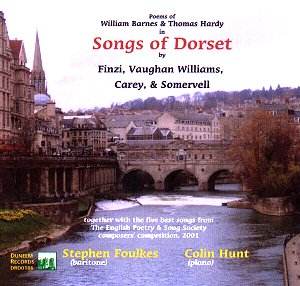Casual purchasers might well pass over this disc on
the grounds of its rather short overall measure and the fact that it
is a recording of a live performance (one put on by The Engish Poetry
and Song Society in Bath during March 2002). They would be wrong to
do so on both counts: on the latter, the performances (and the excellent
recording) have immediacy and convey a genuine sense of occasion, with
audience noise kept to an absolute minimum, while on the former count
the repertoire is of particular interest to lovers of English song.
Dorset, to many of us, means Thomas Hardy and he is
significantly represented here. Holst is not especially known for his
solo songs and such as he did write he did not value highly. Yet the
two examples on this CD get the recital off to a good start and the
extrovert The Sergeantís Song is indeed well known, particularly
as an encore. Finzi also set the same poem (as part of Earth and
Air and Rain), arguably even better. His many Hardy settings have,
since his death, been grouped into "cycles" ("sequences"
might be a more appropriate term) and though I Said to Love (six
songs) is not as often heard as some other Finzi sequences there is
much to treasure in it: the February bleakness of At Middle-Field
Gate, the characteristic lyricism of I Need Not Go and, notable
for its gentle jog-like rhythm, For Life I Had Never Cared Greatly
and the strikingly expansive, even portentous, qualities of the
title song, last and longest of the sequence.
The remaining songs have lyrics by a Dorset poet whose
bicentenary was celebrated in 2001. William Barnes (1801-86) was successively
clerk, teacher and clergyman and a close friend of Hardy. Vaughan Williamsí
songs to Barnesí poems, sometimes in dialect, all come early in his
output, dating from the years 1901-03 and are gloriously fresh in their
invention. Easily the best known of them is Linden Lea, probably
the first Vaughan Williams composition of any length to achieve wide
currency. This was probably composed, and certainly first performed,
hundreds of miles north of Dorset, in South Yorkshire, at Hooton Roberts,
the family home of VWís great friends, the Gattys. But the other songs
Ė Blackmwore Maidens and The Winterís Willow have almost
a folk-like quality Ė are also well worth hearing. Arthur Somervell
is an underestimated figure (A.E. Housmanís A Shropshire Lad recalls
for us VW or Butterworth, perhaps Ireland or Moeran, rather than Peel
or Somervell and the latterís Tennyson cycle Maud is fine, too)
Ė The Motherís Dream is Victorian in feel and idiom (it dates
from 1915) but is more than a ballad. Clive Carey (1883-1968) will be
a name unfamiliar to many. A composition pupil of Stanford, he pursued
a career as a singer and operatic producer; he began setting The
Starlight Express in 1915 but Elgar was then given the nod for this.
The Spring is a nicely-rounded imagination; its occasional chromaticisms
perhaps prevent us from categorising it as a ballad.
Finally Ė though they occur in the programme between
Finzi and Vaughan Williams Ė we have the five best songs from the EPSSís
2001 composersí competition in which entrants were required to set a
Barnesí poem. Adjudged the best was Roger Lordís Come, with its
beautifully fluent vocal line (Corn a-turnen yollow, placed fifth,
is briefer but has the same quality) and its magical ending in which
the word "come" fades away into nothingness. Brian Daubney
is well known to many BMS members and his evocation of a rural thunderstorm,
placed second, is imaginatively done. Alison Edgar and Judith Baileyís
longer settings both have points of interest, not least in the accompaniments
Ė ostinato-like in Jeäne, pictorial in the rather episodic
The Wind at the Door. Taken together the five songs offer stimulatingly
varied responses to a poet who is perhaps still undervalued.
All these composers, well known or not, find a sympathetic
advocate in Stephen Foulkes. He is sonorous, unfailingly musicianly
in his interpretations and outstandingly clear in diction (all the words
are, however, reproduced in the booklet). Colin Hunt is a responsive
accompanist, making the most of his not inconsiderable opportunities.
Balance between the artists is excellent and all told this is another
winner from Dunelm Records which, I repeat, no-one who professes an
interest in British song should ignore.
Philip Scowcroft
AVAILABILITY
DUNELM RECORDS DRD0186 (47:43) £10.00 + 95p p&p, from 2 Park Close,
Glossop, Derbyshire SK13 7RQ (e-mail: sales@dunelm-records.co.uk;
web site: www.dunelm-records.co.uk)


